Introduction
How much does it cost to tint car windows? Prices range from $99 to $850. Discover key factors that affect cost and find the best tinting option for your car. Whether it’s shielding your car’s interior from UV damage or boosting privacy, window tinting offers a range of practical benefits.
In this guide, we’ll break down ” how much does it cost to tint car windows ” and explore the various factors that influence pricing, compare DIY and professional options, and help you make an informed decision. Whether you’re looking for basic tints or advanced UV protection, this comprehensive guide will help you understand everything about the costs involved.
Table of Contents
The Basics of Window Tinting
What Is Car Window Tinting?
Before diving into ” how much does it cost to tint car windows “, it’s essential to understand what window tinting is and the different options available.
Car window tinting involves applying a thin film to the interior surface of a car’s windows. This film is designed to reduce the amount of light and heat that passes through the glass. Window tinting comes in various materials and types, Each type of tint impacts ” how much does it cost to tint car windows “, depending on the material used and the benefits offered.
The main types of window tints include:
- Dyed Film: The most affordable and basic option. It provides a darkened appearance, mainly for aesthetic purposes and some heat reduction.
- Metalized Film: Contains small metallic particles that help block heat and UV rays. It is more durable but slightly more expensive than dyed film.
- Ceramic Film: The highest-quality film, offering superior UV protection, heat rejection, and clarity without interfering with electronic signals.
These tints not only enhance your vehicle’s appearance but also offer benefits like UV protection, glare reduction, and increased privacy. Understanding the different types of tints helps you gauge how much you’ll spend depending on your preferences and needs.
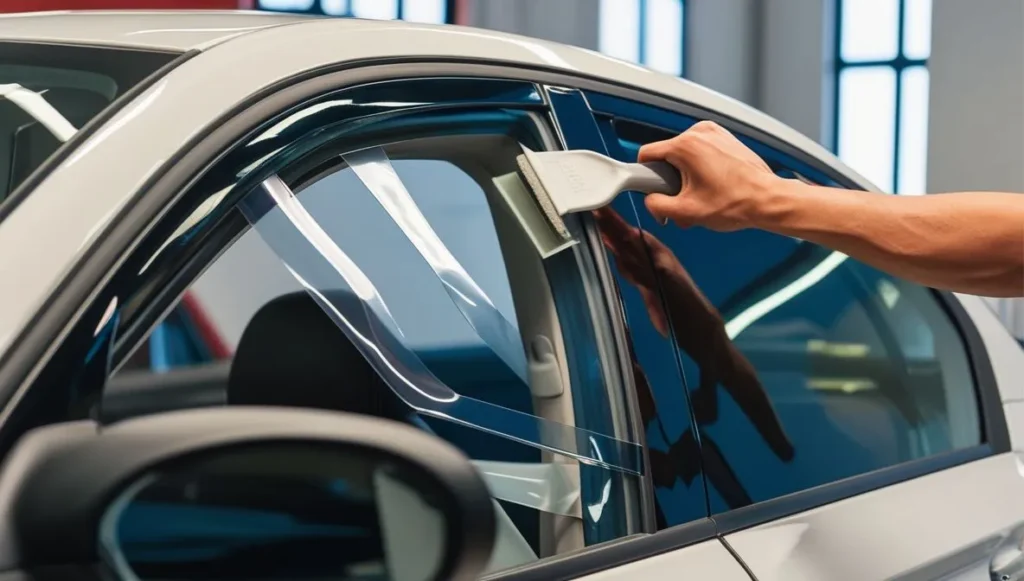
Average Cost: How Much Does It Cost to Tint Car Windows?
The cost of tinting your car windows can vary significantly based on multiple factors. If you’re wondering ” How much does it cost to tint car windows “, here’s a breakdown of typical price ranges you might encounter:
- Basic Dyed Film Tinting:
- Typically costs between $100 and $400 for the entire vehicle.
- It’s the most budget-friendly option, offering basic privacy and appearance improvement but minimal heat rejection and UV protection.
- Metalized or Hybrid Film Tinting:
- Prices range from $200 to $500, depending on the type of car and the number of windows being tinted.
- These tints are more effective at blocking heat and UV rays, and they are more durable than dyed tints.
- Ceramic Film Tinting:
- For those wondering ” How much does it cost to tint car windows “ with a premium ceramic tint, expect to pay $300 to $800 or more for better UV protection.
- They offer the best performance, with excellent heat rejection, superior clarity, and long-lasting durability.
The final cost of ” How much does it cost to tint car windows “ depends on the quality of the tint, the size of the vehicle, and the installer’s rates. For instance, ” How much does it cost to tint car windows ” for a large SUV or a luxury car will typically be higher than for a compact sedan.
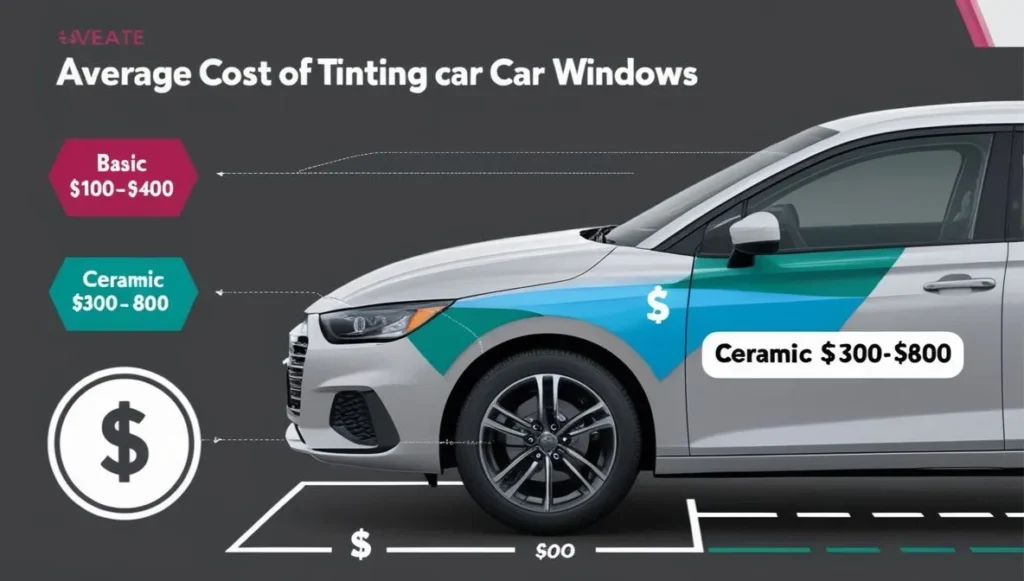
Factors That Influence the Cost of Window Tinting
Several factors can impact ” How much does it cost to tint car windows “. Knowing these will help you understand the price fluctuations and choose the right option for your budget:
- Type of Tint Film
- The type of film you choose is the most significant factor influencing the price. As mentioned, dyed films are the cheapest, while ceramic films are the most expensive. Each type has its specific purpose, such as privacy, UV protection, or heat rejection.
- Number of Windows
- Tinting all the windows of your car will cost more than tinting just a few. Some owners prefer to tint only certain windows (e.g., rear windows for privacy), which reduces ” How much does it cost to tint car windows ” overall.
- Vehicle Size and Type
- The make and model of your car play a role in the cost of tinting. Tinting the windows of larger vehicles, like SUVs or trucks, is more expensive because there is more glass to cover. Conversely, tinting a compact car is usually cheaper.
- Labor Costs and Installation Quality
- The cost of labor varies depending on whether you choose a professional installer or go the DIY route. How much does it cost to tint car windows? it will be higher with professional services, but they guarantee a high-quality installation with fewer issues like bubbling or peeling.
- Additional Features
- Some tints come with added features, such as UV-blocking properties, heat rejection, or scratch resistance. These features improve the overall performance of the tint but can significantly raise the cost. Premium options, like ceramic films, are pricier because they offer better protection against the elements.
Knowing these factors allows you to budget more effectively for your car window tinting, ensuring that you choose the option that balances your needs, and your wallet. How much does it cost to tint car windows?
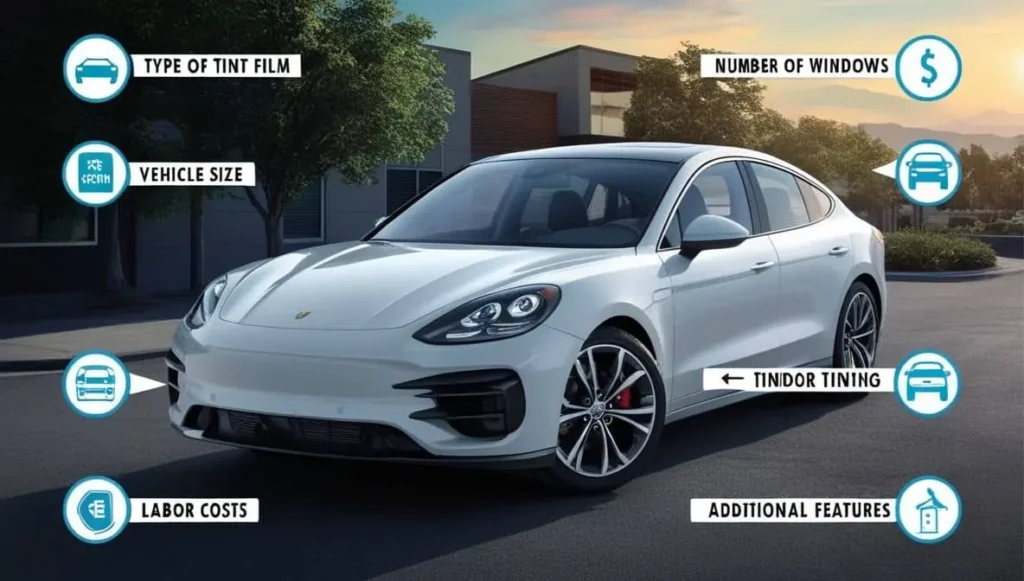
Practical Applications of Car Window Tinting
Cost Comparison: DIY vs. Professional Car Window Tinting
When considering ” How much does it cost to tint car windows “, one of the key decisions is whether to opt for a DIY tinting kit or hire a professional installer. Each option has its advantages and disadvantages, as well as varying cost implications.
- DIY Tinting Kits:
DIY window tinting kits are widely available and are a popular choice for budget-conscious car owners. You can purchase a DIY tinting kit for anywhere between $50 and $150, depending on the quality of the film and the size of your vehicle. These kits come with pre-cut tint films for your specific car model, along with basic tools for installation.
Advantages:
- Lower Cost: Opting for DIY kits can lower ” How much does it cost to tint car windows “, though the process carries a higher risk of installation errors.
- Convenience: You can apply the tint at your own pace, without needing to schedule time with a professional.
Disadvantages:
- Skill Level Required: Applying window tint correctly requires precision and patience. It’s easy to make mistakes, leading to bubbles, wrinkles, or uneven application.
- Lower Quality Results: Even with a good-quality DIY kit, the final result may not match the professional-grade finish. DIY tinting often doesn’t last as long and may need to be redone sooner.
- Professional Window Tinting:
On the other hand, professional installation ranges from $200 to $800 or more, depending on factors such as the type of tint, the number of windows, and the expertise of the installer.
Advantages:
- Professional installers have the expertise and tools to ensure a flawless application, free from bubbles or creases, which helps justify ” How much does it cost to tint car windows ” when opting for professional services.
- Durability: Professionally installed tints generally last longer because they use higher-quality materials and precise techniques.
- Warranty: Many professional services offer warranties on their tinting, giving you peace of mind in case of defects or issues with the tint over time.
Disadvantages:
- Higher Cost: The most significant downside of professional tinting is ” How much does it cost to tint car windows “ with expert installation. However, the superior finish and durability often justify the higher price for many car owners.
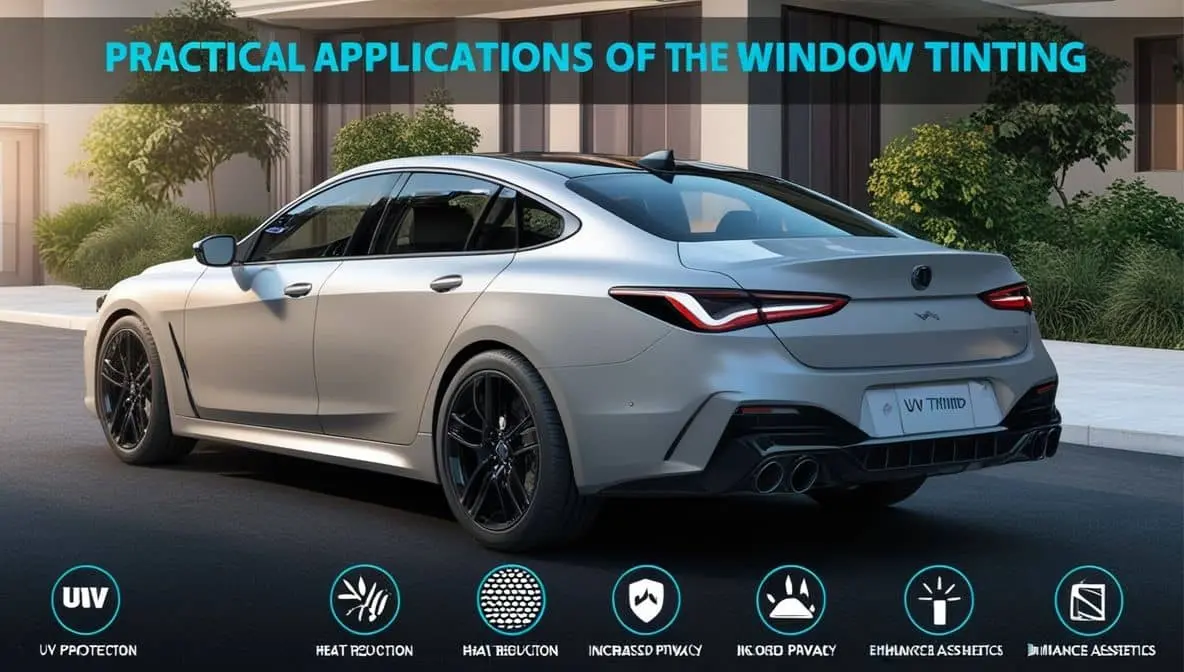
Which Option Should You Choose?
If you’re curious about ” How much does it cost to tint car windows “, comparing DIY kits with professional installations can help you determine the best option. However, if you’re looking for a more durable, professional-grade tint that will last longer and come with a warranty, paying for a professional installation is worth considering. For most car owners, the long-term value of professional tinting outweighs the upfront cost.
Legal Considerations for Tinting Car Windows
Before you tint your car windows, it’s essential to understand that window tinting laws vary significantly depending on where you live. These laws dictate how dark or reflective your car windows can be, and violating them can result in fines, forced removal of the tint, or even impounding your vehicle in extreme cases. Here’s what you need to know about the legal aspects of car window tinting:
- State or Country Regulations:
Different regions have varying regulations regarding the Visible Light Transmission (VLT) of car window tints, which measures how much light passes through the windows. For example, in the U.S., the allowable tint percentage varies by state:- California: Allows a minimum of 70% VLT on the front side windows.
- Florida: Requires 28% VLT or higher on the front windows and 15% VLT on the rear windows.
- Texas: Permits 25% VLT on the front side windows.
Countries like the UK and Australia have similar restrictions, where front-side windows must allow a minimum of 70% of light through.
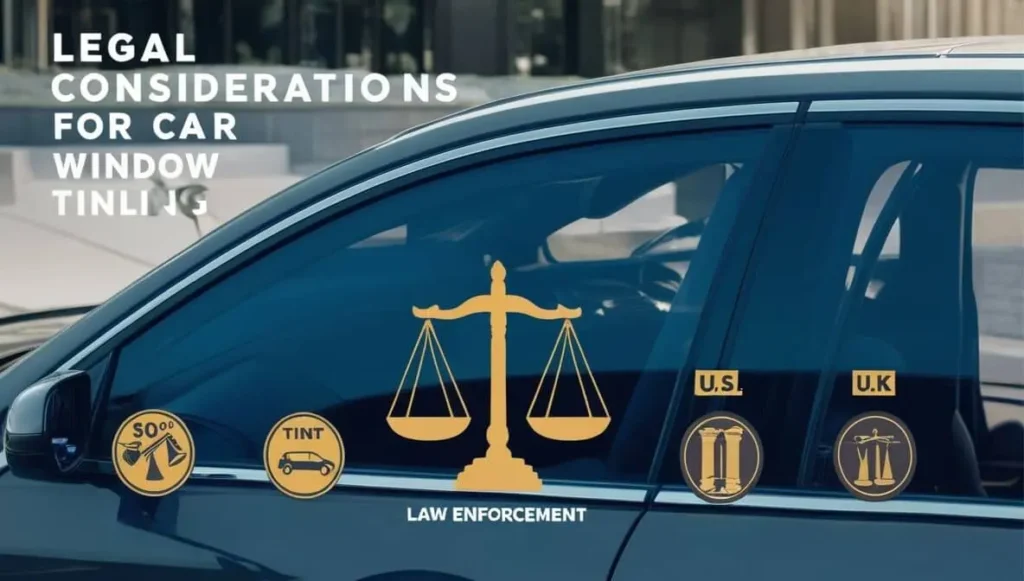
- Windshield Tinting Laws:
Most regions prohibit tinting the front windshield except for a small strip at the top, commonly referred to as an “eyebrow.” This strip is typically allowed to be tinted more darkly to reduce sun glare but must not obstruct the driver’s vision. - Fines and Penalties for Illegal Tint:
If your car windows exceed the legally permitted tint darkness, you can face fines ranging from $50 to $500, depending on the severity of the violation and your location. In some cases, you may also be required to remove the illegal tint, which can increase the ” How much does it cost to tint car windows “. Furthermore, insurance companies may refuse to cover accidents if illegal tinting obstructed the driver’s vision. - Removal and Replacement Costs:
If you need to remove or replace illegal window tinting, expect to pay an additional $100 to $300 for professional removal. This adds to the overall cost of tinting, especially if you need to reapply legal tint afterward.
How to Stay Within the Law
- Always check your state or country’s regulations before choosing a tint level.
- When working with professional installers, ask them if they adhere to local tint laws. Most reputable services will ensure that the tint complies with the law to avoid legal issues.
- If you’re using a DIY kit, carefully choose the VLT percentage according to the legal limits in your region.
Maintenance Costs and Longevity of Car Window Tinting
Once you’ve had your windows tinted, maintaining the tint properly is essential to ensure it lasts as long as possible. The longevity of your window tint affects ” How much does it cost to tint car windows ” in the long run, as it depends on the type of film used and how well it is maintained. Here’s what you should consider:
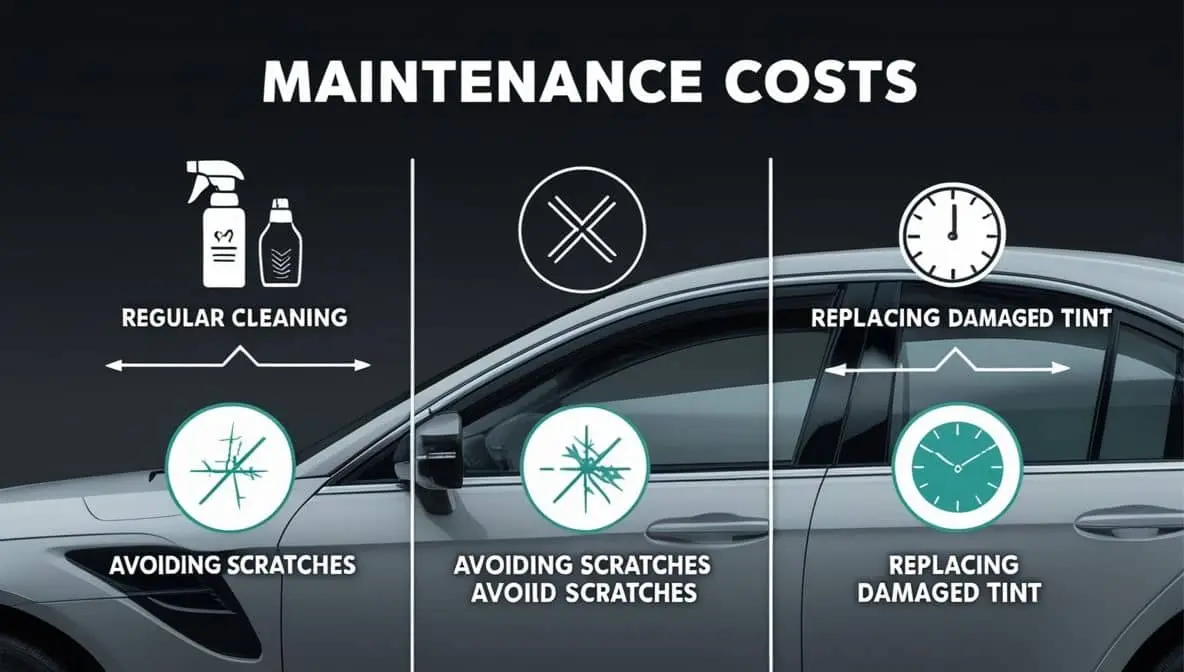
- Durability of Different Tint Films:
- Dyed Films: The most affordable option, but they tend to fade over time, typically lasting around 3 to 5 years with proper care.
- Metalized and Hybrid Films: These tints are more durable and can last anywhere from 5 to 10 years, offering better heat rejection and protection against UV rays.
- Ceramic Films: The most durable option, ceramic tints can last over 10 years, making them a worthwhile long-term investment for car owners who want maximum performance.
- Potential Issues Over Time:
Even the best window tints are subject to wear and tear. Some common issues include:- Bubbling: This can occur if the tint film starts to lift from the window due to poor installation or age.
- Peeling: Over time, exposure to heat and sunlight can cause the edges of the tint to peel away from the glass.
- Fading: Lower-quality tints are more likely to fade after extended exposure to UV rays.
- Maintaining Your Tint:
Proper care can extend the lifespan of your window tint and prevent the need for premature replacement. Here are some maintenance tips:- Wait Before Cleaning: After installation, avoid cleaning the windows for at least a week to allow the tint film to properly adhere to the glass.
- Use Gentle Cleaners: When cleaning tinted windows, use a non-ammonia-based cleaner and a soft microfiber cloth to avoid scratching or damaging the film.
- Avoid Sharp Objects: Be careful when handling objects inside the car that could scratch the tint, such as seatbelts or tools.
- Replacement Costs:
If your tint requires replacement, the cost can range from $150 to $500, depending on the number of windows, the type of tint, and the size of the vehicle. Keep in mind that high-quality tints like ceramic films are more expensive to replace but offer superior durability and long-term value.
By maintaining your tinted windows and selecting the right film, you can lower ” How much does it cost to tint car windows ” over time by avoiding frequent replacements.
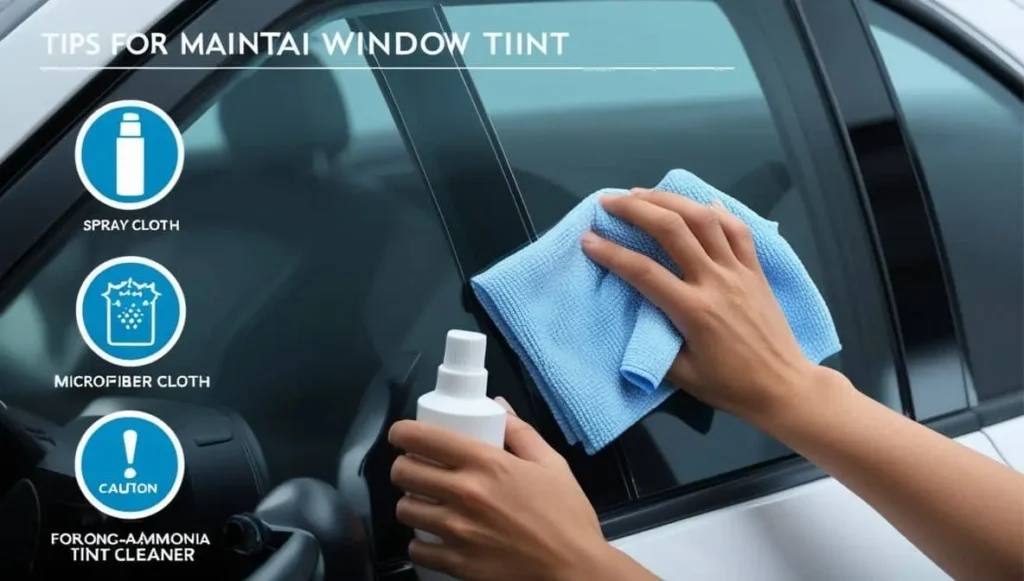
The Future of Car Window Tinting
Advanced Window Tinting Technologies and Costs
As the automotive industry continues to evolve, so too does the technology behind window tinting. In recent years, several advancements have emerged that offer even more benefits for car owners. While these technologies may increase ” How much does it cost to tint car windows “, they provide significant advantages in terms of comfort, safety, and energy efficiency.
- Smart Tint:
One of the most cutting-edge developments is smart window tinting, also known as electrochromic window tinting. This technology allows the tint to adjust its darkness based on light conditions. For example, the tint can darken when exposed to intense sunlight and lighten at night or in cloudy conditions. This smart tinting provides optimal comfort and protection without requiring manual adjustments. However, ” How much does it cost to tint car windows “ with smart tinting is significantly higher, often starting at around $500 per window and increasing depending on the complexity of the system. - Photochromic Film:
Another advanced technology is photochromic tint, which reacts to UV light levels. Similar to transition lenses in eyeglasses, photochromic tints automatically adjust to changing sunlight intensity, providing dynamic shading. While this type of tint is less common, it is gaining traction for luxury and high-end vehicles. Expect to pay $400 to $1,000 for photochromic tint, depending on the car model and number of windows. - Nano-Ceramic Films:
Nano-ceramic window tints represent the latest innovation in tinting technology. These films use nanoparticles to block heat and UV rays more effectively than traditional ceramic films. When considering ” How much does it cost to tint car windows “, nano-ceramic tints are a premium option. What sets nano-ceramic tints apart is their ability to reject heat without darkening the windows too much, allowing for clear visibility while still providing high-performance heat rejection. This feature makes them an excellent choice for regions with intense sunlight or consistently high temperatures. Nano-ceramic tints can cost between $500 and $1,500 for an entire vehicle, depending on the brand and installer. - Solar Control Films:
While not as widely known, solar control window films are gaining popularity due to their energy efficiency. These films are designed to block up to 99% of UV rays and a significant amount of solar heat, reducing the need for air conditioning and improving fuel efficiency. If you’re wondering ” How much does it cost to tint car windows ” with solar control films, they are more expensive, often ranging from $700 to $1,500, but they can offer long-term savings in energy costs, especially in regions with intense sunlight.
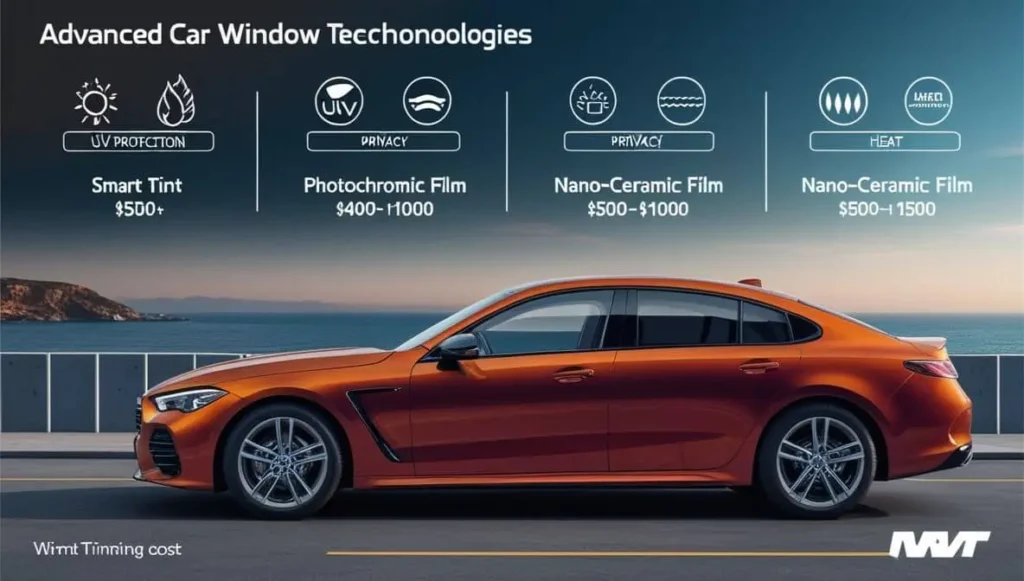
Is It Worth the Investment?
Advanced window tinting technologies are undoubtedly more expensive than traditional tints, but they offer superior performance, durability, and comfort. For those who prioritize energy efficiency, privacy, and cutting-edge technology, the investment in smart or photochromic tints can be worthwhile. However, for the average car owner, traditional or ceramic tints still provide excellent protection while keeping ” How much does it cost to tint car windows ” at a more affordable price point.
How Much Does It Cost to Tint Car Windows? Frequently Asked Questions (FAQ)
1. How long does car window tinting last?
The longevity of window tints depends on the type of film used and the quality of the installation. Dyed films typically last around 3 to 5 years, while ceramic and metalized films can last 10 years or more with proper care.
2. Can I tint my car windows myself to save money?
Yes, you can purchase DIY tinting kits for between $50 and $150, cheaper than professional installations. However, ” How much does it cost to tint car windows ” using DIY kits may increase if errors like bubbling, peeling, and uneven application require reinstallation. Professional tinting offers a higher-quality, longer-lasting finish.
3. How much does it cost to remove window tint?
If you need to remove old or illegal tint, the cost typically ranges from $100 to $300, depending on the complexity and size of the windows. Removal can be more expensive if the tint has been misapplied or has aged poorly.
4. Is it worth investing in ceramic or nano-ceramic window tints?
Ceramic and nano-ceramic tints are a worthwhile investment for car owners seeking superior UV protection, heat rejection, and longevity. When considering ” How much does it cost to tint car windows “, these options may be higher, but they offer more durability than dyed or metalized tints and enhanced performance, particularly in hot climates.
5. How can I check if my tint is legal?
Always refer to your state or country’s regulations regarding Visible Light Transmission (VLT) limits. You can also consult with a professional tint installer who will be familiar with the legal requirements in your area. Tint meters can measure the darkness of your windows if you are unsure.
6. Does window tinting affect my car’s resale value?
Yes, window tinting can enhance your car’s resale value, especially if it is professionally installed and offers premium features like UV protection and heat rejection. However, when considering ” How much does it cost to tint car windows “, illegal or poorly installed tints may lower the value, as buyers would need to have them removed or replaced.
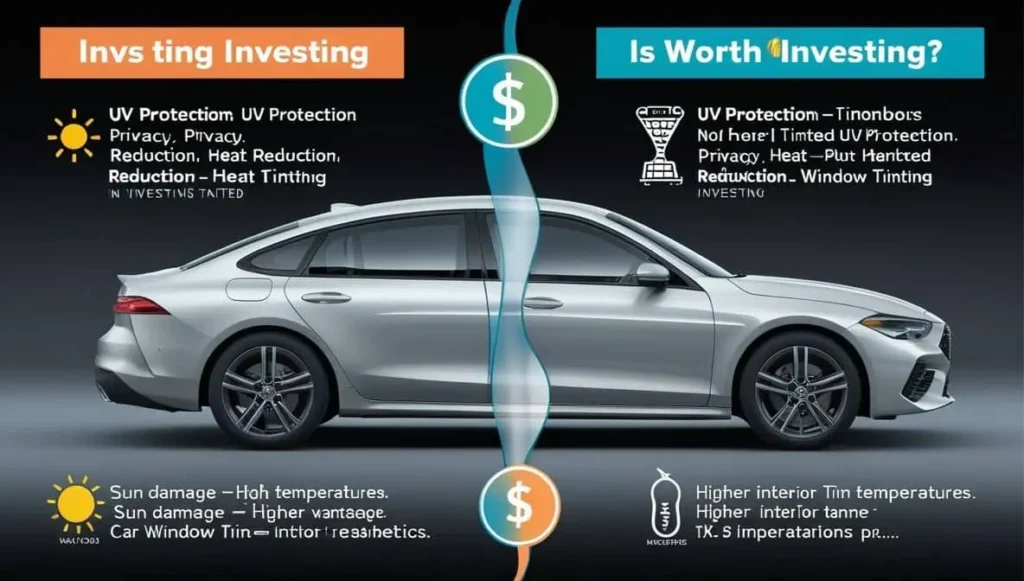
Conclusion: Is Window Tinting Worth the Investment?
After considering all the factors that influence ” How much does it cost to tint car windows “, it’s clear that the price can vary widely depending on your choices. Whether you opt for a budget-friendly DIY kit or a premium nano-ceramic film with advanced UV protection, there is a window tinting option to suit every need and budget.
At the lower end of the price spectrum, dyed films offer basic benefits like privacy and a sleek appearance for around $100 to $400. Mid-range options like metalized and hybrid films provide more durability and heat rejection, while ceramic films—though more expensive—offer top-tier performance for $300 to $800.
For those looking toward the future of automotive technology, smart tints, and photochromic films bring the cutting edge of window tinting to your car. While these options come with a higher price tag—often exceeding $1,000—they offer unparalleled control, energy efficiency, and UV protection, making them ideal for high-end vehicles or car owners in extremely sunny climates.
Ultimately, the decision to tint your car windows comes down to your priorities—whether it’s reducing glare, enhancing privacy, protecting your car’s interior, or simply upgrading its appearance. For many, window tinting is not only a practical investment but also a way to personalize their vehicle while improving its functionality.
Before tinting your windows, check local laws to avoid legal issues. Whether you choose a DIY kit or hire a professional, understanding ” How much does it cost to tint car windows ” and its benefits will help you decide. Ready to start? Visit our car maintenance section for tips or explore DIY guides for the best option.

